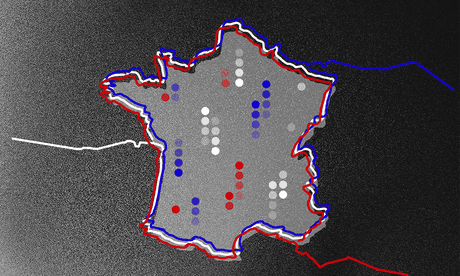Observer editorial
Emmanuel Macron is expected to win but voter support for Marine Le Pen shows the threat of the far right must be tackled

Marine Le Pen has dropped plans to restore the death penalty and leave the euro, making her candidacy more acceptable to centre-right voters.
Photograph: Chesnot/Getty
Sun 3 Apr 2022
Despite his unpopularity – 54% of French voters disapprove of his performance in office – Emmanuel Macron is widely expected to win a second five-year term in France’s presidential election, whose first round will be held next Sunday. Yet it is already clear who has won the campaign as opposed to the vote: the populist forces of far-right nationalism grouped around the candidacies of Marine Le Pen and Éric Zemmour.
As leader of the National Rally, formerly the Front National, Le Pen has strengthened her grip on second place after a shaky few months. Her support is at about 20%, against Macron’s 28%, and she is closing the gap. As matters stand, Macron would beat her in the two-candidate second-round runoff on 24 April by 56-44%, although one poll last week suggested the margin has shrunk to only six points. Predicted low voter turnout is increasing uncertainty.

French election polls: who is leading the race to be the next president of France?
The appeal exerted by Zemmour has faded but remains significant. The Islamophobic pundit-polemicist has about 10% support. If the first-round far-right vote, including the 2% who support the fringe party, Debout la France, united around one candidate, Macron would be pushed into second place.
Luckily for Macron and France, this is unlikely to happen – on this occasion, at least. And in the second round, enough socialists, communists, Greens, centre-right conservatives and followers of the hard-left candidate, Jean-Luc Mélenchon, can be expected to hold their noses and back Macron, if only to keep Le Pen out of the Élysée.
If so, that would be a repeat of the 2017 runoff result. But while Macron won easily then, by more than 30 points, his margin this time may be in single figures. So how has Le Pen made up so much ground? Observers point to hard work and an ability to learn from past mistakes. Eschewing large rallies, she has tirelessly courted the working-class “vote populaire” through personalised, town-hall-type gatherings up and down the country while Macron strode the international stage.
If and when Le Pen loses again, far-right supporters may conclude moderation of any kind does not pay
Zemmour’s repulsive, headline-catching anti-immigrant rants may have helped highlight Le Pen’s relatively less extreme stance. Unlike him, for example, she says Ukrainian refugees are welcome. She has dropped plans to restore the death penalty and leave the euro. This shift reflects her strategy of detoxifying a party long seen as irredeemably racist, thereby rendering her candidacy more acceptable to centre-right voters.
It’s working, up to a point. A study published by Le Monde found fewer voters now see Le Pen as a threat. While 50% would still not vote for her under any circumstances, the figures were higher for Zemmour (64%) and Mélenchon (53%). The downside is that if and when Le Pen loses again, far-right supporters may conclude moderation of any kind does not pay.
This is the huge challenge facing a Macron second term. Like Britain, France is struggling with the destructive impacts of deindustrialisation, globalisation and austerity. Extremism of the right (and left) has flourished among working-class voters who feel betrayed and forgotten. As with Brexit and in Trumpist America, a divisive discourse demonises migrants, Muslims and minorities of all kinds. It is fatally corrosive of society.
The Ukraine crisis has understandably distracted Macron from campaigning. But pernicious forces are advancing at home, too, and he needs to do better at thwarting them and pulling the country back together. The trend is clear. The root causes of national distress must be addressed – or France could face a far-right nightmare in 2027.
No comments:
Post a Comment